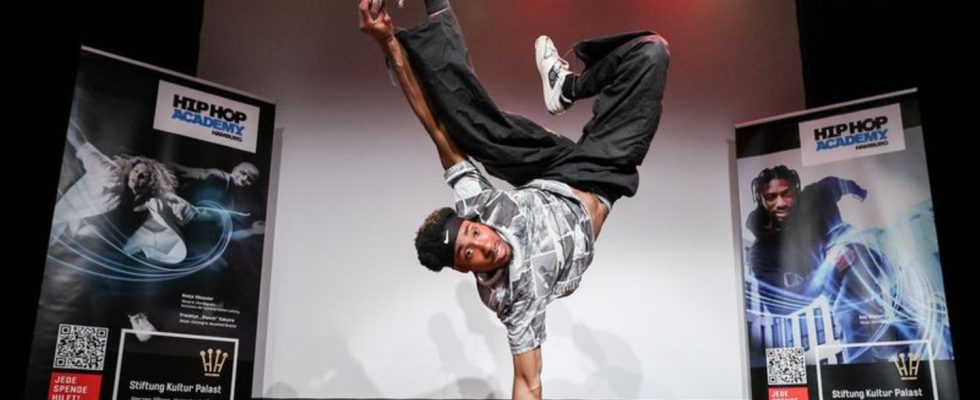Dance
Breaking between the Olympic premiere and the scene
Breaking dancer Noah Tete. The dance sport is celebrating its Olympic premiere. photo
© Christian Charisius/dpa
Breaking is Olympic for the first time. Two German dancers are still in the qualification. In the scene, the trip to the big stage is also viewed critically.
Jilou’s story is already a small one Sports fairy tale. Growing up in poor circumstances with her parents receiving social welfare, she discovered her love for breaking at the age of twelve. The dance changed her life and sparked an impressive ambition.
Jilou works part-time in hotels and organic markets for a while and then trains. She rises to the top of the world, big sponsors come, she can make a living from her passion. The next milestone is to be achieved this summer: participation in the Olympic Games in Paris.
The 31-year-old, whose full name is Sanja Jilwan Rasul, is the great German hope at the Olympic premiere of breaking. Jilou has already come third in the World Cup twice and her level is unmatched in this country. Ten places are still available for the Olympics; the decision will be made at the final qualifications in Shanghai (May 16th to 19th) and Budapest (June 20th to 23rd). “I have an extremely competitive spirit and the Olympics are a real challenge. I’m one of those who can do it,” says Jilou.
Premiere and (temporary) farewell
In addition to the Berliner, Pauline Nettesheim is the second B-Girl – that’s what the dancers are called – for Germany. The European Championship sixth place sees her chances of making it to Paris as “maybe 50 percent”, but part of her will definitely be there at the Summer Games. Nettesheim was one of the athletes who was included in the design of the Olympic clothing. The fact that the pants now have a zipper to safely store your cell phone and keys is based on their ideas. “That doesn’t sound like a big deal, but it was important to us,” says the pharmacology doctoral student.
Breaking has its origins in New York, where it emerged in the early 1970s as part of hip-hop culture. A good decade later, the phenomenon achieved widespread popularity, the media became aware of it and coined the term breakdancing. On the Place de la Concorde, nestled between the Arc de Triomphe and the Louvre, Breaking will be held under the banner of the five rings for the first time – and possibly for the last time.
Breaking will not be taking part in the 2028 games in Los Angeles; the organizers preferred the sports of lacrosse and flag football, which are extremely popular in the USA. “It’s a shame that the decision was made before we could show what we can do in Paris,” says Pauline. She reduced her doctoral position to train professionally. What is certain is that we will go back to research after the Olympics at the latest.
“Three floors higher”
Jilou, on the other hand, can make a living from breaking. She has a slightly different perspective on the decision. “It’s a bit of a relief for me,” she says. “If the decision had been made after that, I might have felt like I had done something wrong. So the chance was officially taken away from us.”
Just being included in the Olympic program has already changed a lot. “Breaking is now more recognized as a sport in society,” says Pauline. Structures have been created, new platforms, more is being reported. “We are now three floors higher,” says Felix “Rossi” Roßberg. He is the state coach in Saxony and is convinced that “the structures created have long-term value”.
Olympics changes dance
However, this also divides the scene, similar to what was once the case with snowboarding and most recently before skateboarding’s Olympic premiere in Tokyo. Breaking is now part of the world association and has been integrated into a bureaucratic apparatus. “This changes dance because the Olympics need a transparent jury system,” explains Holger “Killian” Köhler, one of Jilou’s trainers. Some of the world’s best dancers, who stand out for their very extravagant style, would therefore never make it to the Olympics. But: “There are now sponsors that didn’t exist before, that has to be said very clearly.”
The fact that breaking was forced into a bandage system is not well received in the scene. The International Olympic Committee is not the problem. “Olympia wants us as we are,” says Jilou. “The problem is associations that want to take advantage of it.” She sees the games as a great opportunity and is sure “that the ratings will be really good.” And maybe that will convince the organizers of the Los Angeles games after all.

